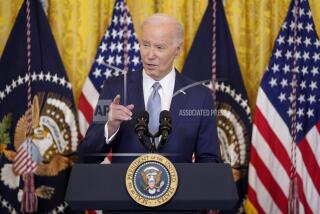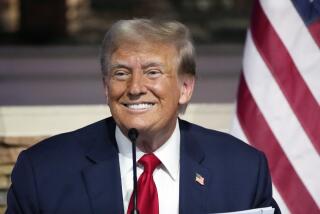High Court Blocks Open Immigration Hearings
WASHINGTON — The Supreme Court, heeding Bush administration concerns about national security, blocked a federal judge Friday from letting the public into immigration hearings resulting from the Sept. 11 terrorism investigations.
It was the high court’s first decision arising from the Justice Department’s strict, closed-door approach to the hearings, and it preserved the government’s controversial strategy of conducting secret hearings of immigrants swept up in the investigations.
The Supreme Court justices, without comment, put on hold a New Jersey district judge’s ruling that the Justice Department’s approach to secrecy was excessive. The high court did not rule on the merits of the case.
The U.S. appeals court in Philadelphia is expected to consider the New Jersey ruling within the next few months, and the entire matter could ultimately return to the Supreme Court.
Until Friday’s Supreme Court action, the New Jersey ruling had opened up the prospect that dozens of immigration hearings stemming from the Sept. 11 investigations could be opened to the public, prompting the Bush administration to seek an emergency stay of the New Jersey ruling.
“This is an extraordinary case, touching on the nation’s very ability to defend itself against the continuing threat of hostile attack from myriad and unknown sources,” Solicitor General Theodore B. Olson argued in a court filing on behalf of Atty. Gen. John Ashcroft. “The vital interests at stake here demand that the government not lose its ability to protect the national security” by even temporarily opening the hearings to the public.
Olson argued that the hearings could reveal sensitive evidence about detainees’ links to terrorism and information about what government investigators have learned, which could benefit terrorists. Immigrants caught up in the investigations enjoyed no general 1st Amendment right of public access to their immigration proceedings, he said.
But others argued that the administration’s insistence on a complete veil of secrecy around cases that have typically involved routine immigration violations is unconstitutional.
More than 750 people have been detained on immigration violations during the Sept. 11 investigations, according to the Justice Department. By mid-June, the number still held had dropped to 74, with apparently none connected to the Sept. 11 attacks on the World Trade Center and the Pentagon, or to other acts of terrorism. Throughout the investigations, immigrant rights advocates, civil libertarians and media organizations have sought basic information about those who have been detained by the federal government.
In an interview Friday, one of the attorneys arguing in the New Jersey case against the Justice Department maintained that Ashcroft’s approach was too sweeping.
“It makes no attempt to try to balance the government’s interest in confidentiality with the public’s right to know and the immigrant’s right to a public trial,” said David Cole, a Georgetown University law professor. “It’s unprecedented to have hundreds of people locked up in secret and tried in secret.”
The legal dispute was sparked by the Justice Department policy after Sept. 11 of demanding closed hearings for immigrants detained as part of the terrorism investigations. The practice was challenged by the American Civil Liberties Union and a group of New Jersey publications.
In late May, U.S. District Judge John Bissell in Newark, N.J., ruled that such secrecy should be applied only on a case-by-case basis. That put the burden on federal prosecutors to show that public access to a hearing would harm their terrorism investigations.
The U.S. 3rd Circuit Court of Appeals in Philadelphia said it would consider an appeal of the case but declined to derail Bissell’s ruling in the interim. The Supreme Court’s action Friday gives the appeals court time to review the New Jersey ruling, while blocking its immediate impact. The administration has asked the appeals court to overturn the decision.
Olson told the high court that opening the hearings to the public, even temporarily, could fundamentally undermine the government’s terrorism investigations. “The harms that would result from disclosure can never be undone,” he said. Olson’s wife, Barbara, a commentator and lawyer, died aboard one of the hijacked jets Sept. 11.
“That an individual in this country could be deprived of his or her liberty in a secret, closed-door proceeding is an extraordinary proposition, one that finds no support in this court’s case law or in history,” ACLU lawyers said in opposition to the Justice Department.
They said even the trials of individuals charged with terrorism are being held in open federal court.
Besides the New Jersey ruling, a federal court in Michigan also found the Justice Department’s approach to be unconstitutional, and that case also is on appeal.
More to Read
Sign up for Essential California
The most important California stories and recommendations in your inbox every morning.
You may occasionally receive promotional content from the Los Angeles Times.










